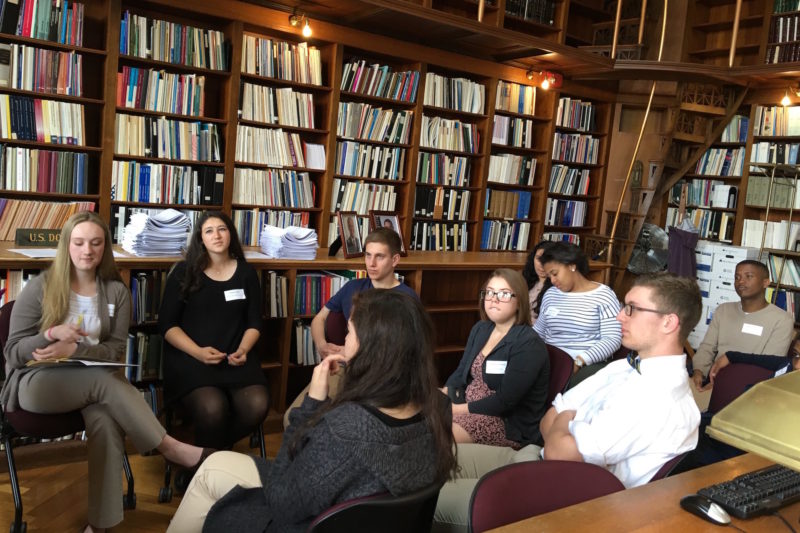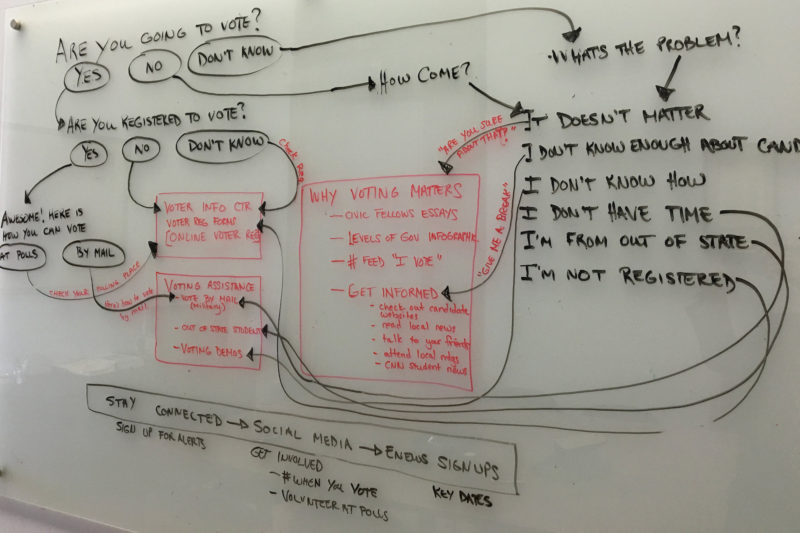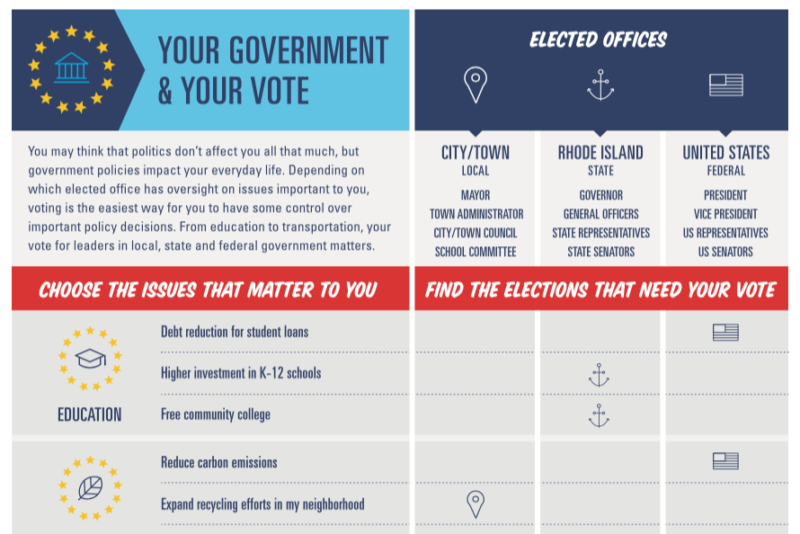Rhode Island Promotes Election Participation with RI Votes Portal
This story was featured in our ELECTricity newsletter in September 2017. Sign up to receive more success stories from election offices across the country. And how is your election office using technology to run excellent elections? Tell us about it by emailing [email protected] – we’d love to share your story!
In every community — large and small, red state and blue state alike — encouraging civic participation is an ongoing challenge. No matter whether turnout is 20% or 80%, election officials recognize that a healthy democracy relies on the active involvement of all citizens.
Rhode Island may be the nation’s smallest state, but it’s come up with some big ideas for motivating people to vote. The Rhode Island Department of State’s innovative RI Votes website goes beyond just providing civic information. Using interactive design, RI Votes addresses visitors with a straightforward, relatable voice, guiding them through the information they need while offering inspiration along the way.
Targeting a problem
Although it’s useful for everybody, RI Votes is focused on reaching young adults in the Ocean State. That’s because, according to Nicole Lagace, who’s Senior Advisor and Director of Communications at the Department, young people have a history of low turnout here.
“While Millennial voter participation is generally low across the nation, with only 21.5% of registered Millennials voting in the 2014 General Election,” Nicole explains, “turnout in Rhode Island has been even lower.”
Nicole reports that just 17% of Rhode Island voters between the ages of 18 and 29 turned out for that November 2014 election, which included major contests for Governor, Secretary of State, and seats in the U.S. House and Senate.
To help tackle this problem, the Department sought out — and received — a grant from the John S. and James L. Knight Foundation’s Knight Prototype Fund. With the grant, Department staff founded a civic fellowship program for high school students, and the ideas for RI Votes came from brainstorming with these fellows.

“The goal,” says Nicole, “was to create a very simple site that walked users through the decision-making process for voting and would drive traffic to our new Online Voter Registration portal. More importantly,” she continues, “we wanted to challenge users who were unsure about voting.”
Nicole and Director of Community Relations Jason Hernandez led a team to develop the site.
Working with Content and Social Media Specialist Joe Graziano, Nicole drafted content and scripts. Jason worked with fellows and found volunteers to be filmed for the video content. Director of Elections Rob Rock verified that information was complete and accurate. And the Department worked with vendors Lakuna Design, Xzito, and Kevin Issa for design, web development, and video production, respectively.
RI Votes launched in the fall of 2016 — just in time to help people register in preparation for the Presidential Election.
Making a case for participation
Most election websites are informative but not persuasive. What makes RI Votes so unusual is that it’s both.
As a starting point, Nicole and Jason’s team wanted to understand the reasons why young people are reluctant to participate in elections. Then, they wanted to challenge each of those concerns with a counterargument.

When you visit the site, the first thing you see is a question: “Are you going to vote?”
If you answer “yes,” the site gives information about registering, options for voting, and details to help you prepare. But if you answer “Don’t know,” the site gears up to offer support.
“If they answer ‘Don’t know,’ we ask them why,” Nicole explains. “They are prompted to pick an answer from some of the most common reasons we’ve heard from Millennials: ‘I don’t have time,’ ‘It doesn’t matter,’ etc. Then we respond with videos from their peers.”
The videos are an essential part of the website’s voice.

“We had their peers film video responses,” Nicole emphasizes, “because we wanted users to feel they were part of a conversation with folks they could relate to rather than being lectured at.”
In another persuasive move, RI Votes emphasizes how each level of government impacts issues that voters care about.
“We often heard in conversations that people don’t vote because they don’t like either presidential candidate,” Nicole recalls. “I wanted to develop a tool that reminded people that there was more to the November election than just the presidential race and that policy decisions about issues they care about are made at all levels of government.”
To do that, the team created an infographic to show how key issues like education and the economy are shaped at the local, state, and federal levels, visualizing the importance of each.

Finally, to make the website’s content more usable, the team used plain language instead of what Nicole calls “bureaucratic government speak” and optimized the design for mobile devices.
Reflecting Rhode Island’s civic pride
Since RI Votes went public last year, it’s been well received.
“People especially like the candor of the video responses and the ease of use,” reports Nicole. “We’ve also received great reviews on the ‘levels of government’ infographic. In fact, we’ve been working to tailor it for different audiences beyond Millennials, and some groups working on civic engagement have incorporated it into their materials.”
In addition to promoting civic engagement, Nicole says that RI Votes reflects a growing emphasis on building civic pride and making it easier to vote in the state.
Nicole explains, “Secretary of State Nellie Gorbea has often said that voting should not feel like a pop quiz. This is why we worked to redesign our voter information guide and promoted tools in the Voter Information Center that allow voters to preview their sample ballot and map out their polling location. It is also evident in the way we approached the RI Votes website.”
If other election officials are inspired by RI Votes and want to create interactive, persuasive election content, Nicole has some suggestions to keep the job manageable and affordable.
“First, be very clear about what your goal is and define your audience. Then, be sure to include your audience in your planning and development process. Ask how you can tweak an idea that already exists to make it work better for your own goal. Finally, if staff capacity is an issue, work to identify funding to collaborate with external vendors.”
As for RI Votes, the Department of State has ambitions to improve the site. Nicole is especially interested in transforming the “levels of government” infographic into a more interactive format, and she says the Department will make additional improvements ahead of the next election cycle.
Has your election office found effective ways to promote civic engagement and reach out to low-turnout voters? We’d love to share your success story with our network of over 1,100 election officials. Email us at [email protected].